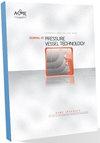Mechanical Stress Analysis of Zero-Boil-Off Cryostat for a 1.5 T MRI magnet
IF 1.4
4区 工程技术
Q4 ENGINEERING, MECHANICAL
Journal of Pressure Vessel Technology-Transactions of the Asme
Pub Date : 2022-05-05
DOI:10.1115/1.4054496
引用次数: 0
Abstract
A whole-body 1.5T superconducting MRI magnet is operated in 4.2K inside a zero-boil-off helium cryogenic vessel i.e. cryostat. The cryostat has horizontal bore of 850 mm used as the patient bore. The cryostat houses the 1.5T superconducting magnet in a coaxial position maintaining a high degree of alignment along with the gradient coil, the birdcage RF coil necessary for any MRI scanner. A set of support link having low thermal conductivity and higher mechanical strength would provide structural support to the cold mass at 4.2K which includes the superconducting magnet, helium vessel. A two stage 4.2K G-M cryocooler is used to recondense helium to achieve a 'zero boil-off' condition. The helium vessel and the vacuum vessel of the cryostat experience stresses during the normal operation, transportation etc. The ASME B&PV Code and the Finite Element Analysis has been used for the engineering design and stress analysis of cryostat. The modal analysis of the cryostat has been done during the transportation of the cryostat. The seismic behaviour of the cryostat has also been analyzed extensively for a 1.5T MRI cryostat1.5T MRI磁体零沸腾低温恒温器的机械应力分析
全身1.5T超导MRI磁体在4.2K下在零沸腾氦低温容器(即低温恒温器)内运行。低温恒温器具有用作患者孔的850毫米的水平孔。低温恒温器将1.5T超导磁体放置在同轴位置,与梯度线圈保持高度对准,梯度线圈是任何MRI扫描仪所需的鸟笼式RF线圈。一组具有低热导率和更高机械强度的支撑连杆将为4.2K下的冷物质提供结构支撑,该冷物质包括超导磁体、氦容器。两级4.2K G-M低温冷却器用于重新浓缩氦气,以实现“零蒸发”条件。低温恒温器的氦气容器和真空容器在正常运行、运输等过程中会受到应力。ASME B&PV规范和有限元分析已用于低温恒温器的工程设计和应力分析。对低温恒温器在运输过程中进行了模态分析。还对1.5T MRI低温恒温器的低温恒温器的抗震性能进行了广泛分析
本文章由计算机程序翻译,如有差异,请以英文原文为准。
求助全文
约1分钟内获得全文
求助全文
来源期刊
CiteScore
2.10
自引率
10.00%
发文量
77
审稿时长
4.2 months
期刊介绍:
The Journal of Pressure Vessel Technology is the premier publication for the highest-quality research and interpretive reports on the design, analysis, materials, fabrication, construction, inspection, operation, and failure prevention of pressure vessels, piping, pipelines, power and heating boilers, heat exchangers, reaction vessels, pumps, valves, and other pressure and temperature-bearing components, as well as the nondestructive evaluation of critical components in mechanical engineering applications. Not only does the Journal cover all topics dealing with the design and analysis of pressure vessels, piping, and components, but it also contains discussions of their related codes and standards.
Applicable pressure technology areas of interest include: Dynamic and seismic analysis; Equipment qualification; Fabrication; Welding processes and integrity; Operation of vessels and piping; Fatigue and fracture prediction; Finite and boundary element methods; Fluid-structure interaction; High pressure engineering; Elevated temperature analysis and design; Inelastic analysis; Life extension; Lifeline earthquake engineering; PVP materials and their property databases; NDE; safety and reliability; Verification and qualification of software.

 求助内容:
求助内容: 应助结果提醒方式:
应助结果提醒方式:


